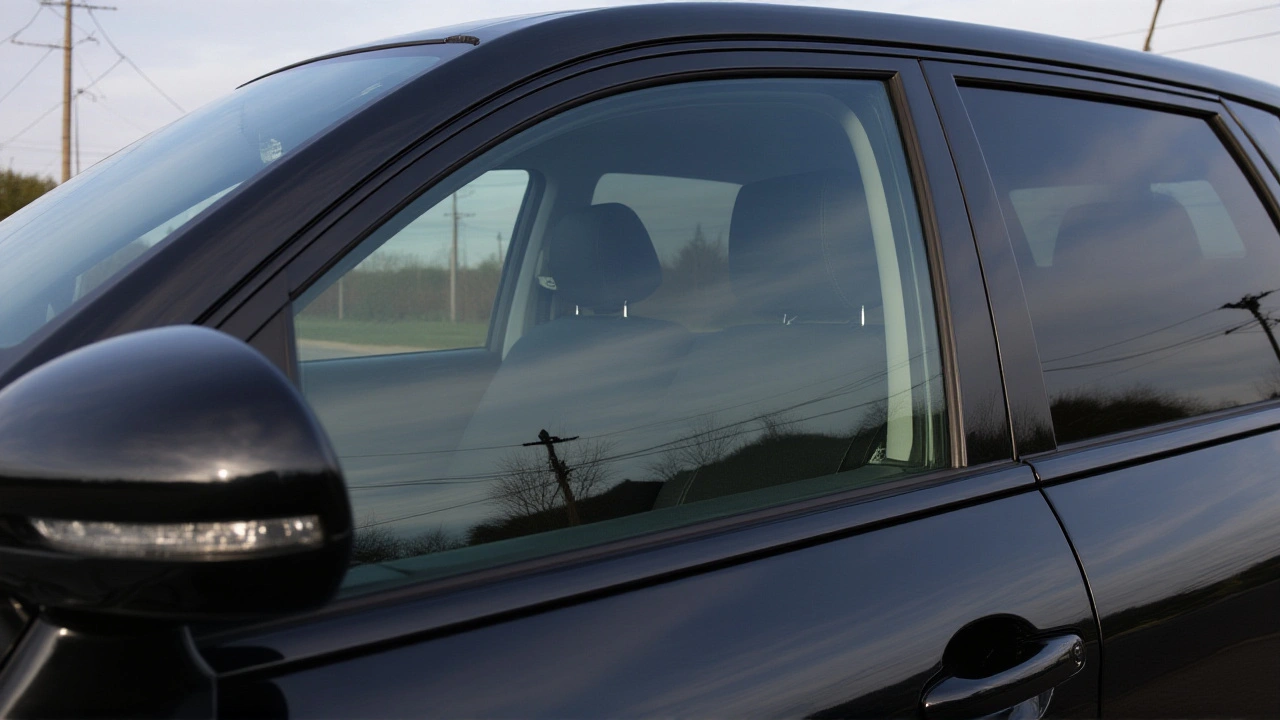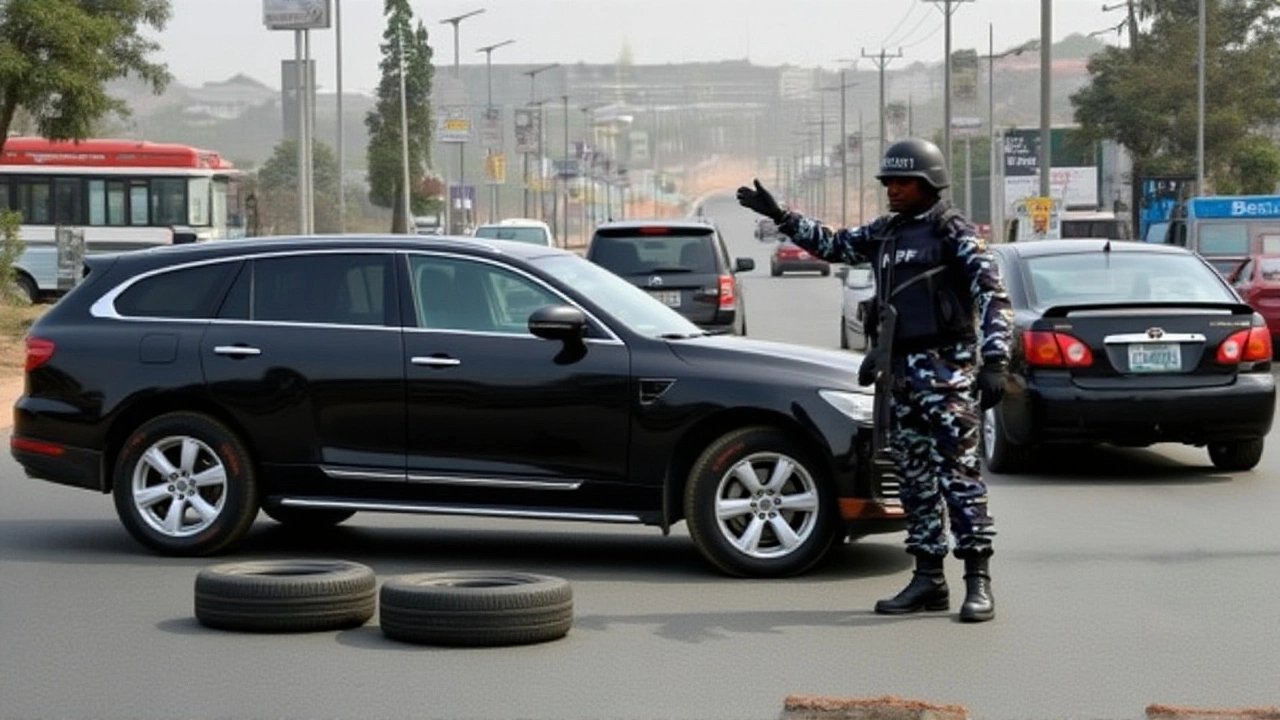
When John Aikpokpo‑Martins, a Lagos‑based lawyer, filed a suit against the Nigeria Police Force, a Federal High Court in Warri stepped in and ordered the force to keep the status quo on the controversial tinted glass permit scheme.
The ruling, issued on 27 September 2025 in case No. FHC/WR/CS/103/2025, specifically named Kayode Egbetokun, Inspector‑General of the police, and instructed him to halt any arrest, prosecution or vehicle impoundment linked to the permit until the court decides the matter's legality.
Background of the Tinted Glass Permit Policy
Back in April 2023, the Nigeria Police Force announced the revival of a permit system that requires motorists with darkened windows to obtain a digital clearance via possap.gov.ng. The scheme had been suspended in 2022 after widespread complaints that it was being used as a revenue‑raising tool.
Initially, the deadline for applications was set for August 2025, but the police extended it to 2 October 2025, giving owners a few more weeks to comply. When the deadline lapsed, officers across the country—most visibly in Lagos—started stopping cars, flashing their badges and demanding proof of a valid permit.
By early October, reports emerged that the Lagos State Police Command had halted traffic on several arterial roads, checking windshields and writing down licence plates of non‑compliant vehicles.
Court Rulings and the Growing Legal Battle
The Warri decision was not the only legal challenge. Earlier in July, the Nigerian Bar Association – through its Section on Public Interest and Development Law (NBA‑SPIDEL) – filed a separate suit in Abuja (FHC/ABJ/CS/1821/2025) seeking a declaration on the policy's constitutionality.
NBA‑SPIDEL’s counsel, Oluchi Nwankwo, warned that the police were “showing reckless disregard for the rule of law” by enforcing a measure that had not yet been judicially vetted.
On the same day the Warri court issued its order, the Lagos Police Command reportedly seized 45 vehicles in Delta and Jigawa states, despite the pending Abuja suit. The contradictory actions amplified public anxiety and fed rumors that the police were ignoring the courts.
Police Confusion and Public Relations Clash
Enter Benjamin Hundan, CSP, the force’s public relations officer. On Saturday, he told reporters that “the police have not been served with the Warri court order,” effectively denying the injunction.
Hundan’s statement sparked a flurry of social‑media posts, with some motorists claiming they were still being stopped, while others said officers had pulled back after hearing about the ruling.
The police’s claim of non‑service raises a procedural question: if a court order is not formally delivered, can its terms be enforced? Legal analysts, such as Professor Chidi Okonkwo of the University of Lagos, argue that “the spirit of the order applies regardless of service, especially when public safety is at stake.”

Public Reaction: Anger, Relief, and Security Concerns
Across Nigeria, citizens voiced a mix of jubilation and frustration. In Lagos, a small business owner posted, “Finally! The court heard us. We can’t afford to pay for a permit when we’re already struggling with fuel prices.”
Conversely, a resident of Delta State, who prefers to stay anonymous, said, “If tinted windows help prevent kidnappers from seeing inside the car, why block us? Security should come first.”
Human‑rights advocates also highlighted the digital portal’s glitches. Many Nigerians reported error messages, broken links, and a lack of clear guidance on how to upload documents—issues that, critics argue, turn a policy meant for security into a tool for extortion.
Implications and What Comes Next
The immediate effect of the Warri injunction is a temporary pause in active enforcement. However, the police have hinted that they will resume once the Abuja suit is resolved. If the higher court finds the permit unconstitutional, the force may have to abandon the scheme altogether.
For motorists, the practical advice is to keep any existing permit documentation handy and, if stopped, politely request to see the court order. Legal experts recommend consulting a lawyer to avoid inadvertent contempt of court, especially if officers act on a belief that the order is not binding.
Meanwhile, the NBA‑SPIDEL is preparing to file an urgent application for a nationwide injunction, arguing that the policy infringes on the constitutional right to freedom of movement and imposes an unreasonable financial burden.

Historical Context: From Suspension to Resumption
The tinted glass debate dates back to 2020, when the police first introduced the permit as part of a broader “specialized services automation project.” Public outcry over perceived revenue generation led to a suspension in 2022. The 2023 revival was framed as a security measure amid a spike in armed robbery and kidnapping cases.
Since then, successive governments have oscillated between enforcement and leniency, reflecting the tug‑of‑war between security priorities and civil liberties.
Frequently Asked Questions
What does the Warri court order actually prohibit?
The order bars the Nigeria Police Force from arresting, prosecuting, or impounding vehicles for lacking a tinted glass permit until the underlying legal challenges are resolved.
Who filed the lawsuit that led to the injunction?
John Aikpokpo‑Martins, a private lawyer, lodged the case in the Federal High Court, Warri, challenging the constitutionality of the permit scheme.
How many vehicles have been seized so far?
Reports indicate that 45 vehicles were impounded in Delta and Jigawa states during the first wave of enforcement after the October 2 deadline.
What are the main arguments against the permit?
Critics say the permit violates constitutional rights, burdens motorists financially, and is riddled with a faulty online application system that hampers compliance.
Will the police resume enforcement after the court case?
The police have indicated they will wait for a final judicial determination. If the Abuja suit dismisses the permit as unlawful, enforcement is likely to stop permanently.
Comments (11)
-
Reid Vance October 6, 2025
Look, the crux of the matter is that the Warri court’s injunction is a clear signal that the police cannot lawfully seize cars without a permit that has yet to be validated by a higher court. The original tint‑glass scheme was rolled out in 2023 under the pretext of security, yet the implementation has been riddled with arbitrary enforcement and an opaque online portal that many motorists can’t navigate. By ordering a status‑quo, the judge effectively says the executive branch must wait for judicial review before expanding its coercive powers. This also protects citizens from what appears to be an extortion racket, because the fines for non‑compliance have skyrocketed while the legal foundation remains shaky. Moreover, the police’s claim that they weren’t served with the order does not absolve them from the spirit of the injunction; courts generally expect agencies to comply once they become aware of a ruling. In short, the injunction buys time for a proper constitutional assessment and, for now, shields drivers from arbitrary impoundment.
-
Javier cox October 7, 2025
Yo, this whole tinted glass drama is kinda wild lol. The police been super pushy about those permits and the portal keeps crashing on me. I think the court step was needed cuz the system was just a cash grab. Hope they sort it out soon, otherwise we’ll keep getting stopped for no reason.
-
Giacinta Pace October 8, 2025
It’s good to see the court standing up for drivers. The permit process was confusing and many people couldn’t afford the fees. Let’s stay hopeful that the legal fight will bring a fair solution for everyone.
-
Gayleen Lowrie October 9, 2025
The police should respect the court order immediately.
-
Wesley Nakamatsu October 10, 2025
In accordance with established jurisprudence, the Warri Federal High Court’s interim injunction operates not merely as a procedural stay but as a substantive barrier against executive overreach. The doctrine of supervisory review empowers the judiciary to curtail administrative actions that lack constitutional grounding, especially where statutory legitimacy remains unsettled. Consequently, the police’s reliance on alleged non‑service of the writ is untenable; the principle of *de facto* compliance obliges adherence to the spirit of the order upon cognizance. Such a stance reaffirms the separation of powers and safeguards the rule of law against ad hoc enforcement measures.
-
Tyler Tucker October 11, 2025
Honestly the whole thing feels like a circus the police just love to throw around vague permits and then act surprised when courts step in it’s a classic power play and the public gets the short end of the stick
-
julia mutambara October 12, 2025
The ramifications of the Warri court’s injunction extend far beyond the immediate suspension of vehicle seizures, touching upon the very fabric of Nigeria’s legal and administrative equilibrium. By halting enforcement of the tinted‑glass permit scheme, the judiciary has effectively forced the police to confront the constitutional deficiencies embedded within the policy. This confrontation is especially salient given that the permit was originally framed as a security measure, yet its practical deployment has been marred by allegations of revenue generation and selective targeting. Drivers across Lagos, Delta, and Jigawa have reported not only financial burdens but also pervasive anxiety stemming from unpredictable traffic stops. Moreover, the digital portal at possap.gov.ng has suffered from systemic glitches, ranging from broken links to enigmatic error codes that leave applicants stranded. These technical failings compound the policy’s perceived illegitimacy, as citizens are forced to navigate a bureaucratic maze that offers little guidance or recourse. Legal scholars, such as Professor Chidi Okonkwo, have underscored the importance of the “spirit of the order,” arguing that adherence to judicial intent supersedes procedural technicalities like service of process. This perspective aligns with broader principles of administrative law, which demand that agencies act in good faith and respect judicial oversight. In practice, the police’s assertion that they have not been formally served may be seen as a convenient pretext to maintain enforcement momentum. Nonetheless, the public’s reaction-a blend of relief, frustration, and renewed calls for security-highlights the delicate balance policymakers must strike between safeguarding citizens and preserving civil liberties. Should the Abuja suit ultimately deem the permit unconstitutional, the police will be compelled to abandon the scheme entirely, reshaping the regulatory landscape for vehicle modifications. Conversely, a ruling upholding the policy could legitimize the permit, but it would likely necessitate comprehensive reforms to address the digital infrastructure and fee structures that have drawn widespread criticism. For motorists, the pragmatic advice remains to retain any existing documentation and to politely request to see the court order if stopped, thereby asserting their rights without escalating tensions. Meanwhile, civil society groups, including the NBA‑SPIDEL, are mobilizing to file a nationwide injunction, emphasizing the constitutional right to freedom of movement and the undue economic strain imposed by the permit. In sum, the Warri injunction serves as a pivotal moment of judicial intervention that could either recalibrate the balance of power or, if dismissed, reinforce a contentious regulatory apparatus that many deem both invasive and financially punitive.
-
Nelleke Elston October 14, 2025
Honestly, I think the whole protest about tinted windows is overblown; if you’re worried about kidnappers, a darker glass actually protects you, and the police are just trying to keep a consistent rule. Who cares if there’s a fee, it’s a small price for added safety, and the court should let the police do their job.
-
Mansi Bansal October 15, 2025
the tinted glass issue is really tricky but we all can learn from it. it shows how a policy can be well inteneded yet poorly executed. lets keep talking and support each other while the courts figure it out.
-
Simardeep Singh October 16, 2025
what i see is that the law is a mirror reflecting the chaos of our society; when we try to control the darkness with permits we end up creating more shadows. the Warri court pause is like a breath, a moment to ask if security can exist without sacrificing freedom.
-
Liz Lessner October 17, 2025
It’s encouraging to see the legal process in action, and while the temporary halt may cause some confusion on the roads, it also offers a chance for constructive dialogue between law enforcement, lawmakers, and the public to refine the permit system.
